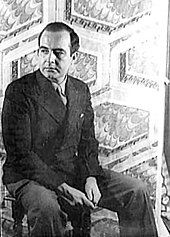Samuel Barber
Samuel Barber (born March 9, 1910 in West Chester , Pennsylvania , † January 23, 1981 in New York ) was an American composer .

Life
Barber began composing at the age of seven. When he was nine, he stated in a message to his mother:
“[...] I was meant to be a composer, and will be I'm sure. I'll ask you one more thing. — Don't ask me to try to forget this unpleasant thing and go play football. [...] ”
“[…] My destiny is to be a composer and I am sure that I will. I would like to ask you one more thing: don't ask me to forget about this unpleasant thing and go play football! [...] "
Barber studied at the Curtis Institute of Music in Philadelphia before joining the American Academy in Rome in 1935 . The following year he wrote his quartet in B minor, the well-known second movement of which he arranged for string orchestra as Adagio for Strings (premiered in 1938 under Arturo Toscanini ). In 1941 he was elected to the American Academy of Arts and Letters and in 1961 to the American Academy of Arts and Sciences .
The popularity of the Adagio has outshone the rest of the composer's work. However, he is considered one of the most talented American composers of the 20th century. He avoided the experimentalism of some other composers of his generation and preferred relatively traditional harmonies and forms. His work is melodious and has often been described as the neo-romantic period in music. None of his other works came close to the popularity of the Adagio , but some are still performed and recorded.
Barber's partner was the composer Gian Carlo Menotti .
Works
In addition to the Adagio for Strings , his best-known work is the opera Vanessa based on a libretto by Gian Carlo Menotti , premiered on January 15, 1958 at the Metropolitan Opera in New York. Gian Carlo Menotti also wrote the libretto for Samuel Barber's nine-minute short opera A Hand of Bridge (1959).
The new Met in Lincoln Center was inaugurated on September 16, 1966 with the premiere of his opera based on the tragedy of the same name by William Shakespeare , Antonius und Cleopatra .
Of his piano compositions, the Sonata op.26 is the most important, not only because it is his only engagement with twelve-tone music, but also because of its enormous difficulties for the pianist - especially in the one at the request of Vladimir Horowitz (who wrote this Sonata premiered on December 9, 1949) added four-part final fugue on a theme peppered with numerous intermittent jumps at a rapid pace .
Piano pieces
- 1949: Piano Sonata op.26
Chamber music
- 1936: String Quartet in B minor, op.11
- 1956: Summer Music op.31 for wind quintet (flute, oboe, clarinet, horn, bassoon)
Works for orchestra
- 1933: The School for Scandal Overture op.5
- 1937: Symphony No. 1 op.9
- 1938: Adagio for Strings op.11 (used in the films Der Elefantenmensch by David Lynch (1980) and Platoon by Oliver Stone (1986), as well as in 1963 in the radio broadcast on the occasion of the state funeral of John F. Kennedy)
- 1939: Violin Concerto op.14
- 1943: Symphony No. 2 op.19
- 1945: Cello Concerto op.22
- 1947: Knoxville: Summer of 1915 op. 24 for orchestra and soprano solo
- 1960: Toccata Festiva for organ and orchestra (commissioned work for the new organ in the Academy of Music (Philadelphia) , world premiere September 30, 1960)
- 1962: Piano Concerto op.38
Vocal works
- 1967: Agnus Dei , adaptation of the Adagio for Strings
- 1969: To be sung on the water
- 1971: The Lovers , setting of Pablo Neruda's Twenty Love Poems and a Song of Despair
Works for wind orchestra
- 1937: First Essay op.12
- 1943: Commando March for Band
- 1955: Medea's Dance of Vengeance op.23a
- Music for Eleven
literature
- Peter Dickinson (Ed.): Samuel Barber Remembered. A Centenary Tribute. University of Rochester Press, Rochester, NY 2010, ISBN 978-1-58046-350-8 .
- Don Hennessee: A Bio-Bibliography . Greenwood Press, Westport, Connecticut 1985, ISBN 0-313-24026-4 .
Web links
- Catalog raisonné
- Literature by and about Samuel Barber in the catalog of the German National Library
- Samuel Barber on stevenestrella.com (English)
- Catalog of works on schirmer.com (English)
- Samuel Barber on klassika.info
- Capricorn - Samuel Barber Society (English / French)
- Samuel Barber in the archive of the Austrian Media Library
Individual evidence
- ↑ Quoted from Barbara B. Heyman: Samuel Barber. The Composer and His Music. New York / Oxford 1994, Oxford University Press, ISBN 978-0-19-509058-1 .
- ^ Members: Samuel Barber. American Academy of Arts and Letters, accessed February 14, 2019 .
- ^ Scott Cantrell: On the Outside Looking In: Gay Composers Gave America Its Music. In: Dallas Morning News. July 10, 2005, archived from the original on December 20, 2008 ; accessed on May 25, 2018 .
- ↑ Clemency Burton-Hill: A Year of Miracles . Diogenes Verlag, Zurich 2019, ISBN 978-3-257-07089-7 , pp. 375 .
| personal data | |
|---|---|
| SURNAME | Barber, Samuel |
| BRIEF DESCRIPTION | American composer |
| DATE OF BIRTH | March 9, 1910 |
| PLACE OF BIRTH | West Chester , Pennsylvania |
| DATE OF DEATH | January 23, 1981 |
| Place of death | New York City |